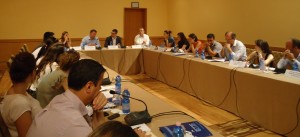Aarhus Convention and the situation in Albania
 On 28 July 2015, European Movement in Albania (EMA) in partnership with Slovak Foreign Policy Association, with the support of the Ministry of Environment, Forestry and Water Administration organized the Session 1 of Working Group IV “Aarhus Convention and the situation in Albania”
On 28 July 2015, European Movement in Albania (EMA) in partnership with Slovak Foreign Policy Association, with the support of the Ministry of Environment, Forestry and Water Administration organized the Session 1 of Working Group IV “Aarhus Convention and the situation in Albania”
Mr. Gledis Gjipali, Executive Director of European Movement in Albania explained the functioning of working groups in the framework of the National Convention on European Integration, assessing the involvement of different stakeholders and the provided recommendations as an important expected result. According to Mr. Gjipali all the interested experts and NGOs would have the opportunity to get informed, involve, discuss with state institutions representatives and contribute in the policy formulations of environmental matters.
During his introductory speech, Mr. Redi Baduni, Director of Environment Directory in the Ministry of Environment, mentioned some positive achievements of the Ministry, specifically in the sensibilisation of the current local units and the new ones about the environment. He recalled the cooperation between REC Albania and Ministry of Justice, in informing and training the students of Magistrate School on legal cases related to environment, in preparing legal package on Environmental Crime, and also the increase in direct decision making process of public opinion and other organizations.
Addressing the Aarhus Convention as ambitious, Mrs. Holta Ymeri, Expert of the Working Group IV, explained in details the three pillars of Convention: The right to Access, Access in Justice and Access to Public Participation in Decision Making. Being a member of this convention, Albania has several laws regulating the access to information about environmental issues and has other laws which provide the right of access to the court not only for persons but even for organizations interested in this field. These laws include: the law “on Environmental Protection” or “the Right to Information” law and also “on Environment Impact Assessment” law where are provided the rights of information about environmental cases to the public. According to Mrs.Ymeri there are still some problems regarding the implementation of these laws, that go beyond the parties but rely on the economic factor.
Mr. Vangjel Kosta, in the authority of a jurist, also member of High Council of Justice, gave his expertise on the cases of Access to Justice. Mr. Kosta considered the Law on Administrative Courts (2012) as a facility on this regard, regardless of the requirements needed to be fulfilled by a subject to be legit at the moment of access to the courts. He listed some obstacles regarding the access to courts such as: the procedures, the information needed for approaching the courts or the economic constraints. He offered a solution for everyone who needs legal expertise, by mentioning the Law on Legal Aid, and some NGOs which offer free legal service. During his speech Mr. Kosta emphasized that there are more cases when the state does not act to protect the environment, than cases of actions against the environment.
Representatives of National Agency of Environment, as the institution of direct implementation of environmental politics with directories in all the 12 districts of the country, explained that their institution’s activity is based as well in the process of consultations with general public. Mrs. Enkeleda Shkurta, mentioned the establishment of an Integrated Environment Monitoring System in creating the pollution maps for all the elements such as air, water, lands, forests and biodiversity. She introduced the initiative to adopt the Transparency Program, data of which would be published online every three months.
During the discussion, Mr. Mihallaq Qirjo, Director of Regional Environmental Center in Albania, pointed out as major issue the restrictions for the citizens and civil society to access the information about sensitive cases. As regard to public perception he quoted some data which give a positive correlation between citizen’s level of education and their information and acknowledgment of environmental matters, as part of a latest survey on Public Perception on Environment to be published on September 2015. Z. Qirjo suggested that during the public hearings the interest group should be targeted carefully and correctly, mentioning as a successful example the public hearings during TAP implementation process.
For further information on National Convention on EU Integration and recommendations of Chapter 27 see also: National Convention on EU Integration – Chapter 27 (Environment)





